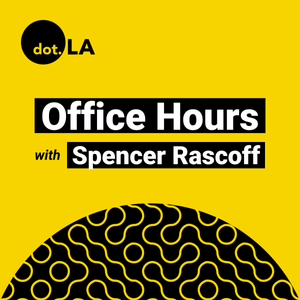
#302 - Leadership In A Corporate Crisis - Rieneke Deelstra
06/08/22 • 79 min
My name's Eksteen De Waal, and today I'm talking to Rieneke Deelstra. One of the things that's always struck me about Rieneke is that she's not somebody that brags, even though she's done some amazing things in life. She's led large-scale transformations within government, she has consulted and coached leaders at the highest level in local government and in the civil service, and at the same time, part-time, she's also qualified as a clinical psychologist. She just gets on with it and gets it done, and it's such a way that everybody just feels comfortable with her. Now, most coaches probably achieve this, but Rieneke is really special in this regard. She's got a way of helping you see a different perspective without it being forced, and I think that's an amazing ability. Now can you imagine how wonderful that is in a time of crisis?
So today we talk about what leadership in a crisis means. What is the impact on top leadership, middle management, and on the employees that work with the clients or the customers?
So we start talking about what does it mean now for hybrid working? What is the scope of what we term as crisis, or in a crisis how do we get our scope as clear as possible? Then we talked about what it is to impress leaders. We then go on to talk about what working with teams means for their improvement during a time of crisis, and how do you interact with your employees in a time of crisis.
How does confidence feature into this and how can reflection with others and bouncing ideas off of others help you? We also talk about how lonely it is at the top, and about the importance of cognitive empathy, and then looking at triggers and previous traumas and how that feeds into a crisis. We then do a quick stop where we talk about coaching versus psychiatry or psychology. And we talk about the attitudes towards. But also attitudes towards security, peace of mind, vulnerability and even mental health in leaders.
I wonder if Rieneke knows how blessed people are to work with her. And I'm not just gushing. Iit's always a genuine pleasure to talk to her and I find her insights very valuable. I think talking about middle-management and the impact of loneliness in senior management has yet again shone light for me on that we tend to forget that leaders are just people.
When we lead organizations, we also need our support. We also need those people that fight for us. They'll tell us we're doing an okay job, as long as they’re not yes-sayers and they’re people that can understand the vulnerabilities, but at the same time, also be honest and straight up with us. I think those kinds of people need to be cultivated, especially ones with high cognitive empathy that can show you things that you may not be able to see.
My name's Eksteen De Waal, and today I'm talking to Rieneke Deelstra. One of the things that's always struck me about Rieneke is that she's not somebody that brags, even though she's done some amazing things in life. She's led large-scale transformations within government, she has consulted and coached leaders at the highest level in local government and in the civil service, and at the same time, part-time, she's also qualified as a clinical psychologist. She just gets on with it and gets it done, and it's such a way that everybody just feels comfortable with her. Now, most coaches probably achieve this, but Rieneke is really special in this regard. She's got a way of helping you see a different perspective without it being forced, and I think that's an amazing ability. Now can you imagine how wonderful that is in a time of crisis?
So today we talk about what leadership in a crisis means. What is the impact on top leadership, middle management, and on the employees that work with the clients or the customers?
So we start talking about what does it mean now for hybrid working? What is the scope of what we term as crisis, or in a crisis how do we get our scope as clear as possible? Then we talked about what it is to impress leaders. We then go on to talk about what working with teams means for their improvement during a time of crisis, and how do you interact with your employees in a time of crisis.
How does confidence feature into this and how can reflection with others and bouncing ideas off of others help you? We also talk about how lonely it is at the top, and about the importance of cognitive empathy, and then looking at triggers and previous traumas and how that feeds into a crisis. We then do a quick stop where we talk about coaching versus psychiatry or psychology. And we talk about the attitudes towards. But also attitudes towards security, peace of mind, vulnerability and even mental health in leaders.
I wonder if Rieneke knows how blessed people are to work with her. And I'm not just gushing. Iit's always a genuine pleasure to talk to her and I find her insights very valuable. I think talking about middle-management and the impact of loneliness in senior management has yet again shone light for me on that we tend to forget that leaders are just people.
When we lead organizations, we also need our support. We also need those people that fight for us. They'll tell us we're doing an okay job, as long as they’re not yes-sayers and they’re people that can understand the vulnerabilities, but at the same time, also be honest and straight up with us. I think those kinds of people need to be cultivated, especially ones with high cognitive empathy that can show you things that you may not be able to see.
Previous Episode

#301 Gangsta Politics - Welcome Witbooi
So what if you worked for an organization that has been 200 years in the making, adheres to no rules of society, abides by no laws, and rules with an iron fist? And that is the numbers gang in South Africa, it rules most of the prisons. And specifically, in this case, I'm talking to Welcome Witbooi, and he led 2,700 people out of the 7,000 inmates at Pollsmoor prison, one of the maximum security prisons in the world, and one of the top 10 most dangerous prisons. So is there leadership in crisis more than a gang leader in a prison? Where you’re constantly under surveillance, constantly being judged and have to perform or your life is at stake.
Well today I’m talking to Welcome Wibooi about that. And we talk about how he got into gangs and what that meant. And then we move on to the hierarchy where we talk about how does the structure of such a gang or such an organization work because it's been around for a while. So, how does it police? How does it govern? How does it operate? What are the operational parameters? What are the sales parameters? What does your supply chain look like? How do you manage all of that? And then how do you discipline? How do you make choices that you know, could cost someone their life? Not just that. How far do you think that through?
We talk about loyalty. We talk about trust and distrust. And who do you trust, but also talk about what can we learn from that and do a comparison between that and modern day corporates? Well, I hope you enjoy this session today because I really enjoy talking to welcome. And he is an interesting character, in that he's reformed and runs his own charity, and at the same time he’s doing his MBA. What a turnaround and what insights. Enjoy this with me.
You know, what I'm taking from the conversation with Welcome today is that he actually thought more about the consequences of applying penalties. Yes. In his case, it would mean someone's life very often. But how often in corporate business do we not make that consideration, not think of the impact, not only on the person, but their coworkers, everybody that they work with, the performance impact on the organization as a whole, or in that department, what mitigating factors we need to put into place.
And it's not just about their skill or their ability, but how could it impact the people around them? Do we think about the emotional impact, the relational impact and the wider impact on that person's family and their friends and associates. He thought about those elements before he made his final decision.
I'm just wondering if we can learn from that in our modern day, corporates. Be a little bit more conscious of what our teams and our organizations really need and be decisive, but considerate.
Next Episode

#303 - Authenticity On Speed - Alan Stevens
Alan has chaired both national and international organisations that champion the interests of professional speakers and have organised the global speaking summit 2022 in Dublin, where the world's professional speakers come together to learn from each other.
A friend of mine introduced me to Allan in 2019, and I have watched and learned from him. he has touched so many lives and leaves them stronger and better for it. I absolutely had to have him on the podcast to share some of his wisdom around crisis and, more specifically, how leaders should communicate in a crisis.
Crises are not planned, not desired and definitely not easy. A crisis needs to be a place where you are on your “A game” yet can also be a crucible for change, and for changing you. When we look back at the war in Iraq, the financial crisis of 2008, the coronavirus and the war in Ukraine, we see changes and choices that may have been postponed for years coming to effect.
I think Winston Churchill said it best. He said “never let a good crisis go to waste”. How often do we see a crisis as only a hindrance instead of an opportunity, a place to look for what can and should change and should have changed? How can we use change as an impetus, as a burning platform that scrambles people to start working on the next future?
In this, communication is critical. Be authentic, stand for what you believe in and find the future after the crisis, remember to create hope. As leaders, hope is one thing that distinguishes us from those that we lead.
After the crisis is something we, as leaders have to take very seriously. Building for a future after a crisis and leading through a crisis is very often just finding the next step. What is your next step in your crisis?
Exponential Leadership - #302 - Leadership In A Corporate Crisis - Rieneke Deelstra
Transcript
My name's Eksteen De Waal, and today I'm talking to Rieneke Deelstra. One of the things that's always struck me about Rieneke is that she's not somebody that brags, even though she's done some amazing things in life. She's led large-scale transformations within government, she has consulted and coached leaders at the highest level in local government and in the civil service, and at the same time, part-time, she's also qualified as a clinical psychologist. She just gets on with it and
If you like this episode you’ll love
Episode Comments
Generate a badge
Get a badge for your website that links back to this episode
<a href="https://goodpods.com/podcasts/exponential-leadership-230581/302-leadership-in-a-corporate-crisis-rieneke-deelstra-26002554"> <img src="https://storage.googleapis.com/goodpods-images-bucket/badges/generic-badge-1.svg" alt="listen to #302 - leadership in a corporate crisis - rieneke deelstra on goodpods" style="width: 225px" /> </a>
Copy




